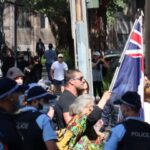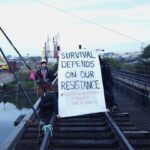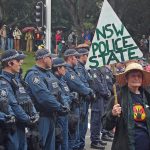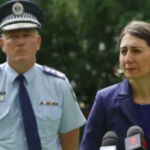NSW Government Effectively Bans Climate Protests, Under Threat of Imprisonment
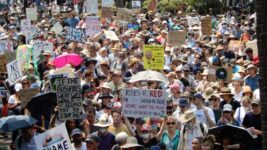
Despite Matt Keen saying the odd environmentally friendly statement, the NSW Liberal Nationals government is a well-oiled machine designed to facilitate the wants of the fossil fuel industry and shield it from a rising number of constituents who oppose its detrimental effects.
For the past decade, the Coalition hasn’t been able to produce effective policies to limit emissions. However, in little over a week, it was able to ram through draconian anti-protest laws, after a few activists put their liberty on the line to directly impact the profits of the fossil fuel masters,.
So, now, we’re talking about actions that used to trigger fines of $440 or $2,200 carrying penalties of up to 2 years imprisonment and/or a $22,000 fine.
But, not to worry, we can still take legitimate forms of protest “in writing, in the mass media” or in authorised street marches and assemblies.
And what’s become plainly obvious is that even with the flooding, the megafires and the extended drought we’ve experienced, when push comes to shove, as the weather becomes more extreme and demonstrations escalate, the authorities are simply going to legislate stricter anti-protest laws.
The scenario from here is already mapped out in a myriad of dystopian films: climate deteriorates further leading to more determined direct actions to prevent fossil fuel extraction, which eventually leads to shoot-to-kill powers being employed when corporate profits are directly threatened.
Clearing obstructions
The Roads and Crimes Legislation Amendment Bill 2022 passed through the NSW Legislative Assembly on Friday afternoon. This was not a scheduled sitting day of parliament, rather the Coalition called it late the night prior, as it was so determined to get these laws enacted.
The changes it makes follow an initial amendment made by NSW metropolitan roads minister Natalie Ward to section 144G of the Roads Act 1993 (NSW), so that trespassing on, damaging or obstructing any bridge or tunnel now carries a $22,000 fine and/or up to two years imprisonment.
Passed on 1 April, the bill, which was introduced by NSW attorney general Mark Speakman, extends the section 144G offence, so that it now covers blocking roads.
Up until last week, this offence only applied to obstructing or damaging the Sydney Harbour Bridge and so too, did the extreme penalties.
With the insertion of section 214A into the Crimes Act 1900 (NSW), the Speakman bill also created the new offence of damaging or disrupting a major facility, which also carries the same draconian penalties as section 144G: up to two years inside and the $22,000 fine.
This new offence involves a prohibition on trespassing, climbing upon or blocking a major facility so that it either damages it, obstructs entry into it, leads to it having to close down or it causes people attempting to enter the facility to be redirected.
A major facility is classed as a railway station or other transport facility, any ports, and infrastructure facilities, including those that deliver energy. This new section 214A offence does not apply when it comes to workers taking industrial action.
Breaking effective protest
Speakman outlined during his second reading speech on the bill that the laws were needed due to the series of coordinated actions Blockade Australia carried out in relation to Port Botany last week, as well as the recent obstructing of peak hour traffic on Sydney’s Spit Bridge by Fireproof Australia.
“As well as the major inconvenience that incidents like these cause to the community, there are also severe financial impacts,” Speakman stressed, “with the cost of this economic vandalism estimated to run into the millions of dollars through direct economic loss and lost productivity.”
“The bill in no way seeks to impose a general prohibition on protests,” the chief lawmaker further fibs. And he goes on to wax lyrical about the importance that protest holds for a working democracy, and how the Summary Offences Act 1988 (NSW) actually facilitates legal protests.
But this is what it all boils down to, the process of getting a protest authorised via the NSW Police Force takes away the ability of demonstrators to use obstruction and inconvenience to put their message across to the general public.
Climate protesters are obstructing roads unannounced as they want to cause disruption to draw public attention to the dire state of the climate, while they’re also targeting facilities because that directly affects the profit margins of the corporations.
A further chilling
The new laws don’t just have the potential to shut down dissent over climate inaction, as the extension of the section 144G offence to roadways has the potential for authorities to shut down expressions of dissent they would rather not take place in public.
Then NSW police commissioner Mick Fuller attempted to have the June 2020 Black Lives Matter protest banned due to COVID. But this was after the first lockdown had been lifted. And despite an initial ruling prohibiting the event from going ahead legally, 10,000 demonstrators showed up.
A last-minute reprieve saw the ban lifted and the protest go ahead. However, without this counter determination, all of those demonstrators obstructing CBD traffic without authorisation could, under the new laws, have been fined $22,000, as well as been thrown in prison for up to two years.
This was the first BLM protest NSW police attempted to shut down that year, yet it wasn’t the last. And it was well understood this was because the demonstrations were raising the issue of police racism and brutality against First Nations people.
So, these new laws may have proven effective in shutting down this expression of public dissent.
Bipartisan approval
As NSW Greens MLC David Shoebridge warned Sydney Criminal Lawyers at the beginning of the week, the Liberal Nationals government did not act in this drastic manner so as to pass laws that enabled the shutdown of the anti-lockdown protests last year, despite the disruptions they posed.
Indeed, it’s well-known that those freedom demonstrations involved participants who are more likely to vote for the right of politics, as well as for more conservative policies, and hence, they didn’t pose any real threat to Coalition leadership.
Climate defenders, however, do pose a major threat. And this is not only for the Coalition. It extends to Labor as well, when it’s in power.
So, that’s why Speakman’s bill was able to traipse its way through both chambers of NSW parliament even though the Greens showed fierce opposition.
“Governments have a responsibility to ensure that freedom of assembly and freedom of protest are not unduly impinged upon,” sniggered Speakman as he ended his speech on the bill. Then he raised its greater duty, which is to ensure any “form of economic vandalism” is put to rest.



